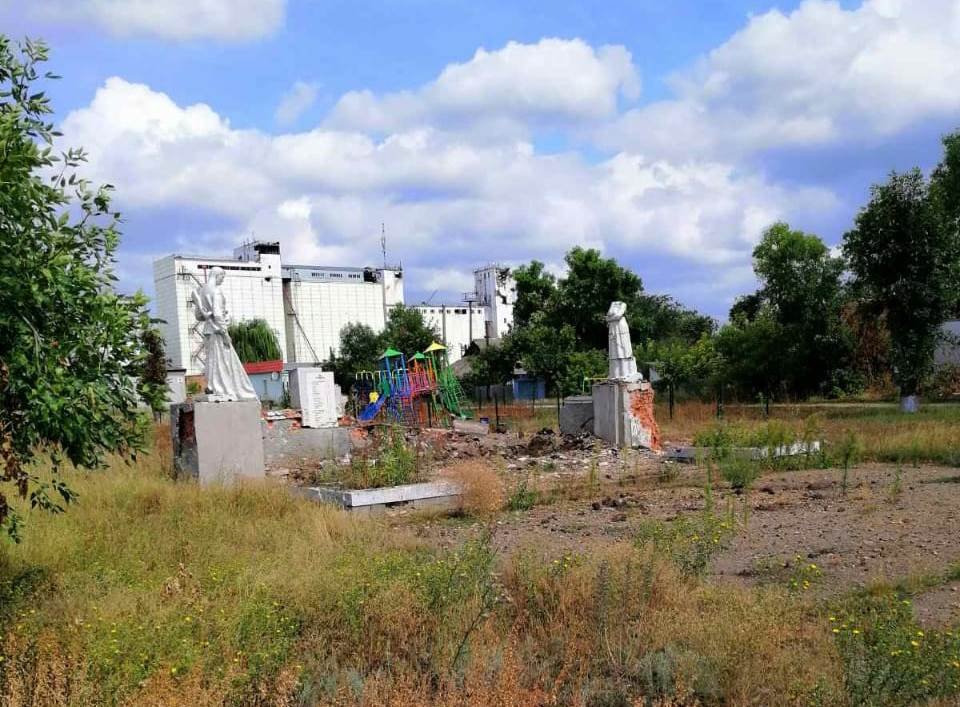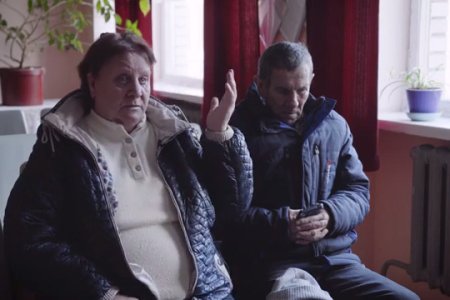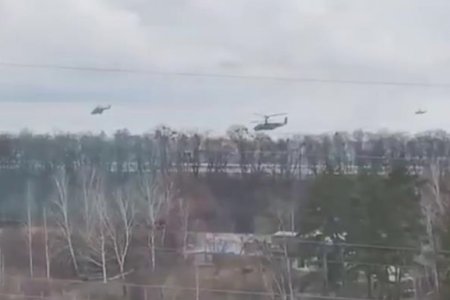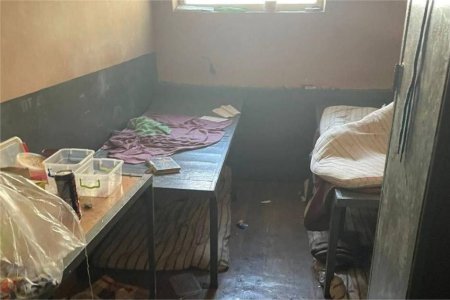I am Hirchak Stepaniia Stepanivna. I came from the Mykolaiv region, Bereznehuvatskyi district, from Bila Krynytsya village. It is the demarcation line with Kherson villages.
How did the war of 2022 burst into your life?
I learned about the war when I saw planes in the sky. I am a widow and live alone. My daughter was in Mykolaiv then, studying at a medical college. The son called and said: “Mom, the war has begun.” I asked: “In what sense?” And then I went outside, saw the planes, and realized that trouble had come. I stayed at home. And where to run in the first days? We sat at home and watched the Russians cross the river to Kherson villages.
We saw that military equipment was constantly arriving there. There were five tanks, and the next morning there were twenty. And every day, more and more. Then people began to think about how and where to run. At first, I did not attach much importance to this as I thought we have remote villages, so who needs us? But it turned out that I was very wrong.
They [Russians] stayed in our villages. They hid between houses, in forests, and plantations.
People who had transport began to leave. However, I didn’t have anything, and without a husband. So I spent a month in the cellar. I packed my things, food, documents, and warm clothes because it was winter and cold. During the day, we sat in the cellar, listening to the bombardment of Kherson villages. Then, we went out when it was quiet. In this way, I spent a month.
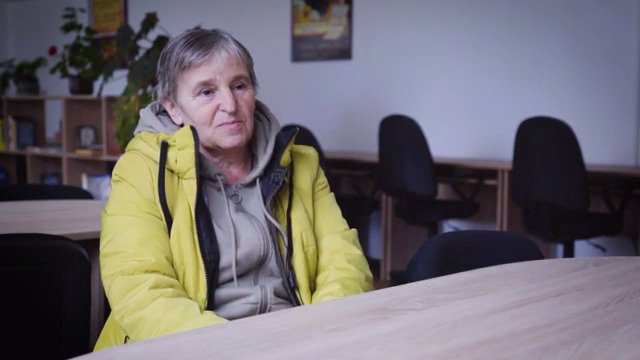
How did you evacuate from your settlement?
A neighbor came to me and said: “Stepanovna, in two hours, there will be transport; I will take my relatives to Mykolaiv. If possible, get ready.” So I gathered everything I could in two hours and ran away from the village. We drove through the woods because they had already begun to bomb roads. It was 25 March: Bashtanka and Bereznegovatoe were shelled.
It felt like I was in an action movie. On the way, we saw burned-down equipment: buses, cars in the fields, winter equipment, everything broken and ruined.
So we escaped, followed by the sound of the sirens. Planes flew over us, but we finally reached Mykolaiv.
How was the occupation of your village?
We constantly heard shelling of Kherson villages. At night we saw the Russians: they settled above the river, behind our town. It’s 200 meters from my house. They shot at night and launched some fireworks. We observed it — such beautiful stars. They fired toward the Kherson region but did not touch us. People were already running away because they knew what to expect next.
The Russians came to our village across the bridge: they drove through the town, looked, and left. Then, during one day, they could drive trucks several times and then return to the river. They had a base there.
Have you witnessed the destruction of civilian facilities?
I went on 25 March. Some people still remained in the village — those who did not want to leave their properties. I had chickens, and I left them to a neighbor. The neighbors said: “Stefa, you go while there is an opportunity. We have cars, and we will leave later.” They called me later and said that the Russians had already begun to bomb the village. We had an excellent recreation center — Bashkirovka. First, the Russians shelled the forest. This recreation center was above the river, and Kherson villages were immediately behind it.
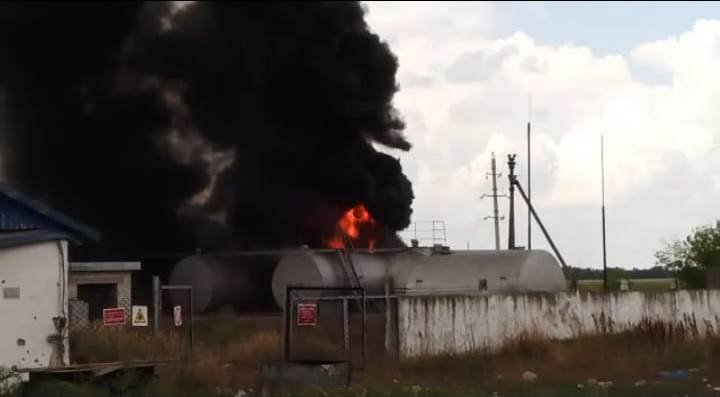
During the call, neighbors said the forest and the upper street were on fire. And then, our soldiers came to the village and told people to evacuate. People were running in all directions. The Russians bombed and destroyed everything. There are no surviving houses left.
Was your home damaged in the fighting?
They showed me a photograph: everything was destroyed and broken. There are no windows, doors, or roof, and the wall has fallen. Now there are no military men there, and people are slowly returning, trying to get what they can from under the rubble. But there is no village. There is nothing — no surviving houses. The photographs show that everything is destroyed or burned down. My house did not burn down, it is standing, but there is such terrible destruction that it is impossible to live in it.
Are you aware of civilian casualties?
Six remained in the village, and all died. They didn’t want to leave and had nowhere to go. Some hit a mine. Above the river, the cemetery and the recreation center were completely mined. Others were killed in the village. Our soldiers dug up the graves and buried them. One woman was blown up by a mine in the garden when she went to give water to a calf.
Did you have problems with food in the village?
It was hard. We had a woman who owned a bakery. People collected flour, took it there, baked bread, and gave out a loaf per family. You could also go to the district center in Bereznehuvata, but it was scary because of the shelling. It was not easy, but we still had supplies in the cellars. People have stocked up since autumn. Whatever they had, they ate.
We survived as best as we could and shared. For example, I have a lot of bread, and you have something else. We would exchange.
And the head of the collective farm exchanged flour for three-liter bottles and cans. So I traded 20 kg of flour for 20 cans. He had a pig farm: he slaughtered pigs and distributed a kilogram of meat per family. But when everyone left, the Russians destroyed the farm, and the pigs fled, roaming through the forest above the river.
Did you have access to medical services during the occupation?
There was no medical help. We used the reserves we had. Again, we exchanged. For example, my blood pressure rose, and someone had a fever. So we would exchange medicines and cure each other. There were no deliveries.
Do you plan to return home after the end of the war?
We demand that they either rebuild our houses or compensate us for the destroyed homes. Who will help me? I’m a widow. What should I do if they give me materials? How will I pay? For what money should I hire people to repair everything? I plan to stay here in Drohobych. I have nowhere to go.
